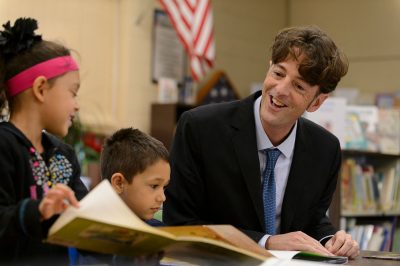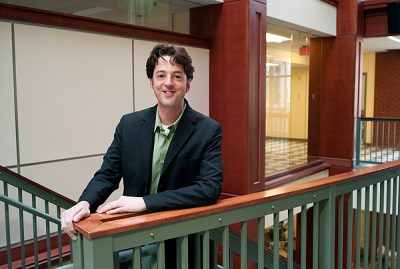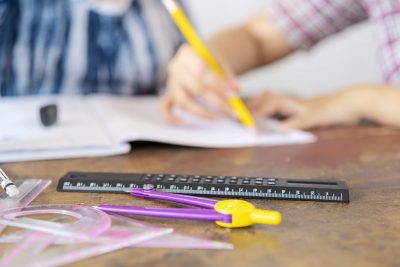
Editor’s Note: This first-hand account of Neag School alumnus Noam Watt ’22 ED, who graduated with a degree in sport management, is about his summer experience with covering the Maccabiah.
As an undergraduate student at UConn, I reported from Gampel Pavilion, Rentschler Field, Elliot Ballpark, and numerous road venues, including Clemson University. I added a new location to my reporting journey this summer: Israel.
I spent July covering the United States Delegation in the 21st Maccabiah. The Maccabiah, frequently referred to as the Jewish Olympics, is the 3rd largest sporting event in the world. I was one of 14 student journalists selected as a part of the Inaugural Maccabi Media Program.
Chaired by longtime Philadelphia 76ers broadcaster Marc Zumoff, the Maccabi Media Program provided daily coverage of Team USA at the 21st Maccabiah, including live broadcasts, feature videos, articles, and game recaps.
Upon arrival in Israel on July 6, we spent the first week touring the country as part of our Israel Connect program – taking hikes in the northern region, floating in the Dead Sea, learning the history of Masada, and visiting the Western Wall in Jerusalem. While the athletes of 42 different sports in the Maccabiah balanced the touring with early morning training camp practices, the media team was hard at work writing stories and producing videos about the day trips. On the Saturday of Israel Connect, I reported from the lowest point on earth at the Dead Sea and then atop Mount Masada. The blazing 100-degree heat was a change of pace from November football games at the Rent.
The sports competitions kicked off on July 12. Our first assignment was covering Men’s Volleyball between the US and Israel. The Israel team was composed of mainly National Team players. They made quick work of the Americans in a three-set sweep. (View a time-lapse video of the media team setting up to film a game.)
The next day we were up at dawn and asleep after midnight. At 6 a.m., we were at the Kraft Family Sports Campus in Jerusalem, setting up for an 8:30 a.m. broadcast of Men’s Soccer between the US and Belgium. As it was our first broadcast of the trip, we learned on the fly how to set up a three-camera broadcast equipped with monitors, intercom headsets, and cables galore. The biggest challenge? Finding internet access in a foreign country. Also, none of us spoke Hebrew. Nevertheless, we managed to find our way onto the air, and the Americans found their way to the back of the net – seven times in a 7-0 win.
After breaking down and packing up our equipment, it was back to the hotel for a power nap before the Opening Ceremony later that night at Teddy Stadium in Jerusalem. We filed into the adjacent hockey arena, country by country, serving as a staging zone. The energy grew as more athletes came in, each decked out in a colorful outfit to represent their nation. As dusk fell, the parade of nations began. We filed out of the hockey arena and into the soccer stadium across the parking lot.
The feeling of being surrounded by so many Jewish people was profound. I would take a moment … to look around and appreciate that everyone there was Jewish.
My job for the night was to film the US Delegation’s entrance into the ceremony. That came with the perk of being at the front of the pack, even in front of our flag bearer, Stuart Weitzman. I will never forget the feeling as all 1,400 Americans in the delegation gathered together, adorned in red, white, and blue striped sweatshirts. It was a feeling of excitement, energy, and Jewish pride. Chants of “U-S-A” rang through the summer air as the anticipation built. Then, from the backstage tunnel, we paraded under an arch and into the spotlight on a stage where the United States flag was being projected. The packed stadium erupted, and the next few minutes were a blur to me as I darted around filming the team.
I remember President Joe Biden waving to our delegation from a box – he was the first US President to attend the Maccabiah. I remember the sound of Miley Cyrus’ “Party in the USA” blaring over the loudspeakers. I remember little kids asking me for my USA hat or throwing their hands out for a high five. I felt like a celebrity. My job, though was to stay locked in and continue filming the actual celebrities, the athletes. We snaked through the crowd and up to our seats, where we got to relax and enjoy a performance full of music, fireworks, and the lighting of the Maccabiah Torch.

The next day, we were back at work, telling stories of athletes like Ethan Zohn, the winner of Survivor: Africa and a goalkeeper on the 45+ Men’s Soccer Team. His team volunteered at the Peres Center for Peace and Innovation in Jaffa, just south of Tel Aviv.
As the competitions continued, there were big wins and close losses. There were miraculous moments, too. On July 19, I was on assignment to cover Wheelchair Basketball, one of the select few paralympic sports in the Maccabiah. With seconds left on the clock and the United States trailing by two, the US got the ball to Allon Doronn, who pulled up from halfcourt and nailed a game-winning buzzer-beater. He was mobbed – not just by his teammates but also by his opponents.
Doronn, an amputee on his left foot, saw his shot quickly go viral, being featured on NBC Sports, ESPN, and countless other sites. It showcased an incredible moment of athleticism and also represented the beauty of adaptive sports.
This was the most meaningful moment of competition during my time in Israel. Adaptive sports are especially important to me because they were an avenue for my oldest brother Aaron to play sports. In addition, sports can be a way to develop skills as a child, make friends, and achieve goals in a supportive setting.
Aaron, who has significant disabilities, played adaptive soccer and basketball growing up. He was paired with volunteers who would work on techniques with him and allow him to play the sports many of us grew up loving. His participation was meaningful to me as his younger brother – so much so that I led the same program as a senior in high school.
To see Doronn’s shot go viral was a validation that adaptive sports matter. They matter because they allow people of all abilities to play sports. They matter because they produce magical moments. They matter because they give all athletes a chance to shine.
As the games ended, the United States racked up the medals, 274 of them in total. There were gold medals in some high-profile sports like Men’s and Women’s Basketball, Women’s Soccer, and Men’s Ice Hockey, and gold for the first time in decades in sports such as fencing. While the athletic achievements were paramount, the experience for athletes, coaches, and media alike was just as meaningful.
The feeling of being surrounded by so many Jewish people was profound. I would take a moment at each sport we covered to look around and appreciate that everyone there was Jewish. It was an uncommon feeling, having grown up in classrooms and on teams where I was one of just a few Jewish kids. But, at the Maccabiah, I was one of many Jewish people. And while I wasn’t competing for gold, I was doing what I love in a country that feels like home to me.
I grew personally and professionally during my three weeks in Israel. Now, I’ll translate it into my work at UConn, where I will be a video assistant for the Athletics Department. But, for now, reporting from back home in the United States, I’m Noam Watt, Maccabi Media.



